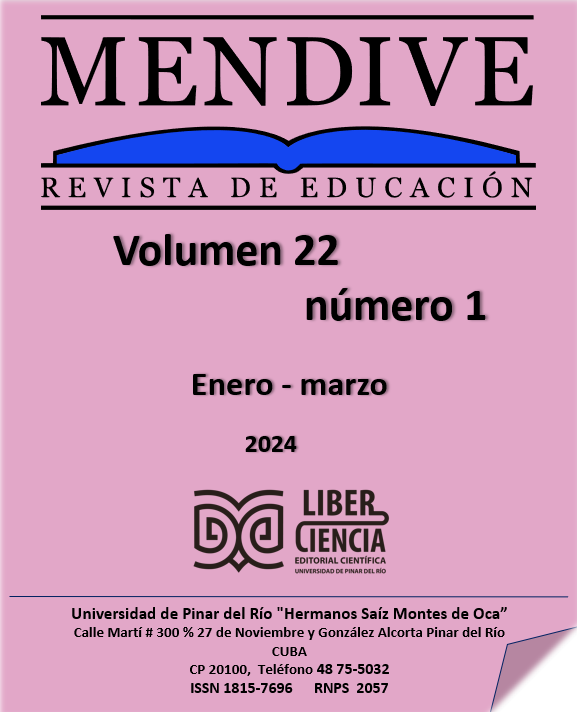Student Empowerment in Learning Assessment and Social Justice in Higher Education
Main Article Content
Abstract
As a result of the 2020 pandemic, an unexpected change occurred in university teaching, which mobilized higher education institutions to make a change in the way in-person teaching was conceived and consequently mobilized institutions towards a new educational paradigm, moving from face-to-face models to hybrid teaching and learning models with synchronous and asynchronous classes. This study aims to describe and analyze the impact of the implementation of evaluation strategies based on the empowerment and active participation of students. The methodology addressed complies with a qualitative approach with case studies. The results obtained show that the commitment of the students, from an evaluation process, which required them to make decisions, has a positive impact showing their expectations of academic achievement. Therefore, it is concluded that the possibility of generating and agreeing with the evaluation students in accordance with the learning results formally established in the program and the syllabus, promoting social justice at the time of evaluation, having each and every possibility to achieve the expected learning, it mobilized them towards a collective commitment among their peers, as well as the confidence of achieving the expected performances. The possibility of going beyond traditional tests, giving space to the generation of other products or evidence that confirms the achievement of learning implied placing students at the center of their own learning.
Downloads
Article Details

This work is licensed under a Creative Commons Attribution-NonCommercial 4.0 International License.
References
Asunción, S. (2019). Metodologías Activas: Herramientas para el empoderamiento docente. Docentes 2.0 Tecnológica- Educativa, 19(1), 1-18.
Baron, P., & Corbin, L. (2012). Student engagement: Rhetoric and reality. Higher Education Research & Development, 31(6), 759-772. http://dx.doi.org/10.1080/07294360.2012.655711
Deneen, C. & Brown, G. (2016). The impact of conceptions of assessment-on-assessment literacy in a teacher education program. Cogent Education, 3(1), 1-14. https://doi.org/10.1080/233118 6X.2016.1225380
Fangfang, G., and J. L. Hoben. (2020). The Impact of Student Empowerment and Engagement on Teaching in Higher Education: A Comparative Investigation of Canadian and Chinese Post-Secondary Settings. In: Student Empowerment in Higher Education: Reflecting on Teaching Practice and Learner Engagement, edited by S. Mawaniand A. Mukadam, 153166. Berlin: Logos Verlag Berlin.
Fetterman, D. M. (2015). Empowerment evaluation: Theories, principles, concepts, and steps. In D. M. Fetterman, S. Kaftarian, & A. Wandersman (Eds.), Empowerment evaluation: Knowledge and tools for self-assessment, evaluation capacity building, and accountability (2nd ed.). Thousand Oaks, CA: Sage.
Förster, C. (2017). El poder de la evaluación en el aula. Mejores decisiones para promover aprendizajes. Ediciones UC.
Freire, P. (2012). Pedagogýa del Oprimido. 2nd ed. Madrid: Siglo XXI.
Glaser, B. & Strauss, A. (1967). The Discovery of Grounded Theory. Chicago, Aldine.
Gómez, M. y Quezada, V. (2020). Análisis de las calificaciones compartidas en la modalidad participativa de la evaluación colaborativa entre docente y estudiantes. RELIEVE. Revista Electrónica de Investigación y Evaluación Educativa, 26(1), 2020,-Junio.
Heitink, M., Van der Kleij, F., Veldkamp, P., Schildkamp, K., Kippers, W. (2015). A systematic review of prerequisites for implementing assessment for learning in classroom practice. ELSEVIER. Educational Research Review, 17, Pages 50-62.
Ibarra, M., Rodríguez, G, Boud, D., Rotsaert, T., Brown, S., Salinas, M. y Rodriguez, H. (2020). El futuro de la evaluación en la educación superior. RELIEVE, 26(1), art. M1.
Leach, L., Neutze, G., and Zepke, N. (2001). Assessment and Empowerment: Some Critical Questions. Assessment &Evaluation in Higher Education, 26(4): 293305. doi: 10.1080/0260293012006345
Miles, M. B., & Huberman, A. M. (1994). Qualitative data analysis: An expanded sourcebook (2nd ed.). Sage Publications, Inc.
Mora-Vicarioli, F. (2019) Estado del arte de la evaluación de los aprendizajes en la modalidad del e-learning desde la perspectiva de evaluar para aprender: precisiones conceptuales. Revista Electrónica Calidad en la Educación Superior, 10, 58-95.
Morales, M., Balcázar C., Priego, H. y Flores, J. (2021) El empoderamiento del alumno: una tendencia favorable en la educación superior. Revista Iberoamericana para la investigación y el Desarrollo Educativo, 12(22).
Rodríguez-Gómez, G., & Ibarra-Sáiz, M. S. (2015). Assessment as learning and empowerment: Towards sustainable learning in higher education. In M. Peris-Ortiz & J. M. Merigó Lindahl (Eds.), Sustainable learning in higher education. Developing competencies for the global marketplace (pp. 120). Cham: Springer International Publishing. https://doi.org/10.1007/978-3-319-10804-9_1
Ruíz, Y. (2019). Evaluación formativa y compartida para el desarrollo de competencias investigativas en estudiantes universitarios. EDUCERE-Investigación arbitrada, 23(75), pp. 499-508.
Sandín, M.P. (2003). "Investigación Cualitativa en Educación. Fundamentos y Tradiciones". Madrid. Mc Graw and Hill Interamericana de España (pp.258)
Segura, M. (2018). La función formativa de la evaluación en el trabajo escolar cotidiano. Revista Educación, 42(1).
Stover, J., Bruno, F., Uriel, F., Fernández, M. (2017). Teoría de la Autodeterminación. Perspectivas en Psicología, 14(2), 105-115
Taberneiro, R. (2015) Empoderamiento de la evaluación en el aprendizaje autónomo. Revista ciencias de la educación, 26(46), 71-82
Tai, J., et al. (2018) Developing evaluative judgement: enabling students to make decisions about the quality of work. High Educ., 76, 467481. https://doi.org/10.1007/s10734-017-0220-3
Úcar, X. (2014) Evaluación participativa y empoderamiento. Pedagogía Social. Revista Interuniversitaria (Sociedad Iberoamericana de Pedagogía Social), (24), 13-19
Wandersman, A., Snell-Johns, J., Lentz, B. E., Fetterman, D. M., Keener, D. C., Livet, M., Imm, P. S., & Flaspohler, P. (2005). The Principles of Empowerment Evaluation. In D. M. Fetterman & A. Wandersman (Eds.), Empowerment evaluation principles in practice (pp. 2741). Guilford Press.
Whitelock, D. (2010). Activating assessment for learning: Are we on the way Web 2.0? In M. J. W. Lee & C. McLoughlin (Eds.), Web 2.0- based-e-learning: Applying social informatics for tertiary teaching (pp. 319342). Hershey, PA: IGI Global. https://www.igiglobal.com/chapter/activating-assessment-learning/45030


